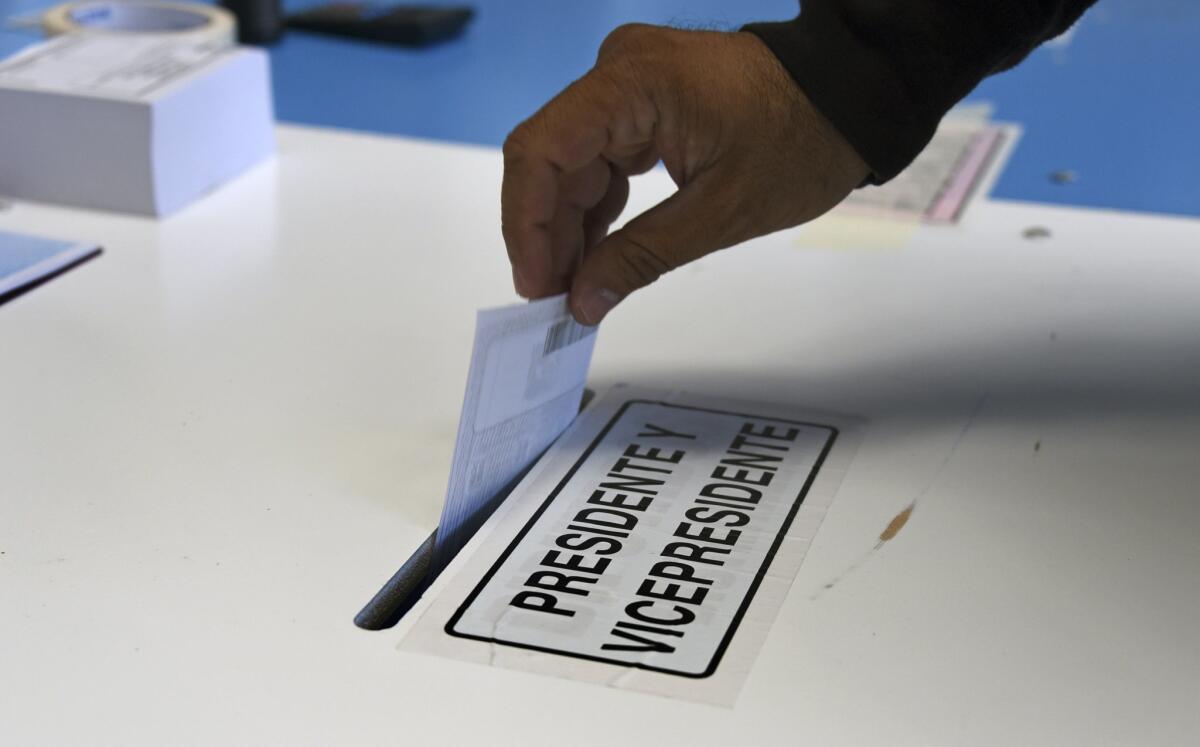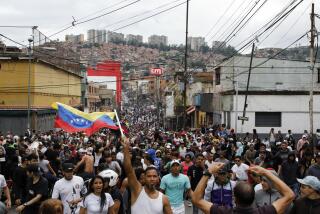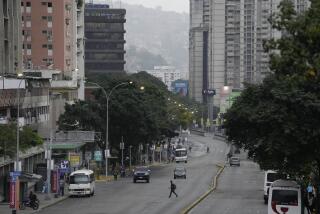Former TV comedian sweeps to power in Guatemalan presidential race

A man casts his vote in Mixco, near Guatemala City, during the presidential runoff on Oct. 25.
- Share via
Reporting from Guatemala City — Jimmy Morales, a political neophyte and former TV comedian, swept into office as Guatemala’s new president Sunday when more than two-thirds of voters backed him in a second round of polling in presidential elections.
Fed up with a political system infected with corruption, nepotism and criminal impunity, the voters chose a political rookie over contender Sandra Torres, a former first lady widely perceived to be part of the old power establishment.
Torres conceded defeat Sunday evening, saying: “The people have made their choice, and we respect it. We are going to offer constructive support that will benefit the country.”
Morales claimed victory after receiving just under 2.7 million votes — a 68.7% percent share of ballots cast — compared with 1.2 million cast for Torres, preliminary results from Guatemala’s Supreme Electoral Tribunal showed.
In a brief video message distributed after Morales claimed victory, Guatemala’s new president-elect said: “With this vote I received a mandate, and the mandate from the people of Guatemala is to fight against the corruption that has consumed us.”
Morales’ victory came as no surprise after polls showed him with a massive lead as voting commenced this weekend. But his huge win over Torres may be as much a reflection of the country’s political turmoil as an endorsement of his qualifications or merit.
“People aren’t voting for the candidate they really want, but rather to reject the other options,” said Pedro Trujillo, director of the political science department at Francisco Marquis University in Guatemala City.
Morales is not without his blemishes; his political party and campaign have been endorsed by retired military officers who many connect with the brutally violent 36-year civil war that ended in 1996. Morales has tried to disassociate himself from such connections.
And at least one of the characters that Morales depicted during his comedy TV career was distinctly racist: “Black Pitaya,” done in blackface.
But a recent survey by ProDatos for the Guatemalan newspaper Prensa Libre found that such factors have done little to reduce his popularity.
“Signs tying Morales to military personnel associated with acts of repression during the civil war and other dark facts from his past don’t seem to have had much impact on the vote registered in our survey,” said the ProDatos research published on Oct. 21 in Prensa Libre.
Trujillo said the pressure will truly begin only when Morales takes office.
“From tomorrow, there will be pressure that the future Cabinet and politics of the new government starting in January 2016 will follow a different route from the old one, which was steeped in corruption,” he said.
With only 11 seats in Congress out of 158, Morales’ National Convergence Front party will be forced to cooperate to some extent with the political old school to govern.
After winning the presidency Sunday, Morales said he wouldn’t accept defectors to his party in congress — part of his “new way of doing politics” — and reiterated his intention to prioritize battling corruption and improving the country’s health and education systems, along with boosting economic development.
After months of peaceful anti-corruption street protests, Guatemala’s former President Otto Perez Molina resigned on Sept. 3 in the wake of an investigation into a customs scandal that resulted in a warrant being issued for his arrest. He resigned just three days before the first round of presidential elections was scheduled to take place — and several months before he was due to step down because of term limits.
The resignation was a victory for Guatemala’s anti-corruption protest movement, credited with bringing together people from all social classes. The decision by the former president to resign came after a series of other transgressions by the politically powerful came to light, many of them revealed by joint investigations carried out by the attorney general’s office and the International Commission Against Impunity, a body created by the United Nations in 2007.
It was those two institutions that uncovered the customs scandal — known in Guatemala as La Linea — in which Perez has been implicated, and he is awaiting trial in a military jail. His former vice president, Roxana Baldetti, is also in jail facing charges for the same scandal.
Voting on Sept. 6 went ahead with a record turnout. Although he was the clear leader, Morales didn’t win the 50% of the vote needed to claim the presidency, hence the second round of voting. During his campaign, Morales ran on the slogan “Ni corrupto, ni ladron” — “Not corrupt, not a crook” — and has been eager to distance himself from Guatemala’s political establishment.
Special correspondents Brigida reported from Guatemala City and Bonello from Mexico City.
More to Read
Sign up for Essential California
The most important California stories and recommendations in your inbox every morning.
You may occasionally receive promotional content from the Los Angeles Times.













